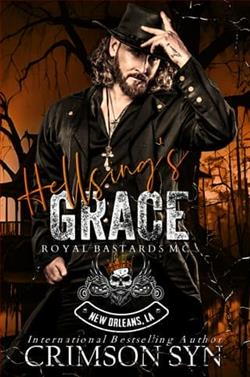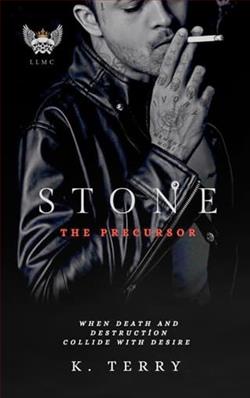Page 63 of Taming the Highland Misfits
* * *
The last time Finley had seen his mother’s grave had been two months previously, and even then a few dandelions had made their homes on it. He had no doubt that by now it would look like a jungle of weeds, as he walked into the cemetery with extreme reluctance.
However, when he, Isla and their daughters arrived at the burial site he stared in amazement. There were no weeds; in fact, the whole plot had been dug over and planted with fresh grass, but that was not the only surprise. Behind the humble little headstone which was all Finley and his aunt had been able to afford was a bigger one. It was not large enough to be ostentatious, and was simply carved with the date of Agnes’s birth and death; the words of love were on the small stone. It said: “Here lies Agnes McGill, the Best Mammy in the World.”
Finley stared at the grave in disbelief for a few moments, then he turned to Isla, his eyes shining with tears of gratitude. “Isla—did you dae this?”
Isla nodded and treated him to a great, beaming smile. “Yes,” she answered. “I did not dig it all myself of course. Laird Mullen lent me a couple of his men. I just ordered the headstone since you wanted a bigger one, but I would never take away the one you put there yourself. It’s by far the more precious of the two of them.”
At that moment, Agnes took Finley’s hand and said: “Da, is that your Mammy under the earth?”
“Aye, hen,” he replied sadly.
“Was she a nice mammy?” she asked. She had no fear of graves or headstones, for as yet she did not understand the concept of death.
“The best,” Finley replied huskily.
“Not as good as my Mammy,” the little girl said as she moved over to put her arms around Isla’s legs.
“She was a lovely lady,” Isla said sadly. “She taught me many things when I was a wee girl. It was because of her that I met your Da, and we got married. She told me lots of stories, and she taught me how to make up stories of my own. And she taught me how to sew and mend my own clothes. And sometimes when I was nasty to people she told me to go and say sorry.”
“She was a very nice lady, was she not, Mammy?” Agnes observed.
“Yes, she was,” Isla answered, smiling down at her daughter. “And if she was here now, I would say thank you to her. I would say: Thank you for giving me my wonderful husband, and through him, my lovely daughters. Thank you for teaching me so much about life and the value of love, even though it was through you and my own mother I learned about the pain of loss. But even in the midst of loss, there is hope for the future.” She patted the round bump on her tummy and smiled. “There is even more hope now.” Isla was sure that Agnes did not understand the meaning of everything she had said, but she felt better for having said it.
Then she turned to her daughters. “Come, Agnes, Edina, put the flowers on your Granny’s grave,” she instructed, and the two girls dutifully did as they were told.
Finley, who was still blinking back tears, spoke up then. “I love ye, Mammy,” he said huskily. “There will never be anybody like ye.”
Isla sighed and put her head on his shoulder, and they stood for a few moments looking at the little monument before Edina became impatient and began to toddle away, followed by her sister.
Finley and Isla walked behind them, laughing at their antics as they teased each other playfully. Finley cast a last glance over his shoulder at his mother’s grave, then smiled at Isla. “No more lookin’ back, Isla,” he said. “I love you, and our girls.” Then he patted her tummy and bent to kiss it. “An’ you too.”
“We love you too, sweetheart.” Isla’s voice was warm and affectionate. “Forever and ever.”











